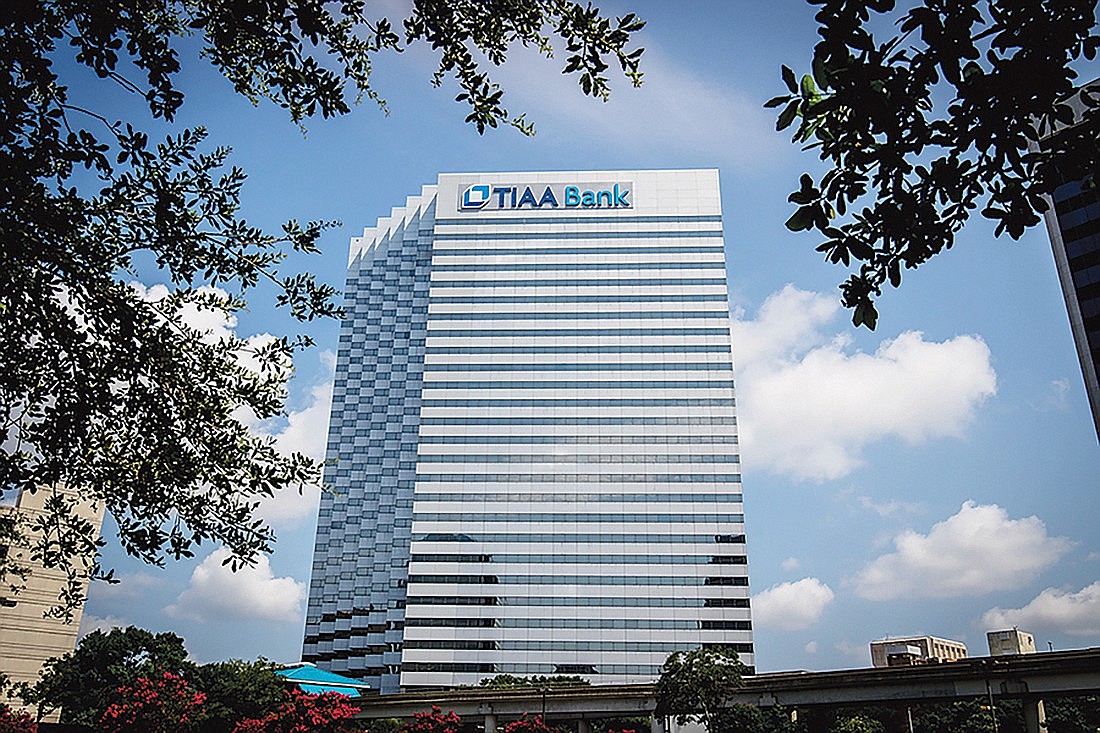
TIAA filed an application with the Federal Deposit Insurance Corp. in March to separate its trust business from the regular banking business of its Jacksonville-based bank, TIAA FSB.
However, nearly six months after announcing an agreement to sell the bank to a group of investment funds, TIAA has not publicly filed the application to approve the sale and the company is not giving any more details.
The additional details include a new name for the bank after the sale, which is much anticipated in Jacksonville because it will necessitate a change in the name of the city’s football stadium.
“We’re working on the transaction,” TIAA bank spokesman Michael Cosgrove said April 17, but he said it is the company’s policy to not comment on regulatory matters.
“Our expectation is the transaction will be approved in the second half of the year,” he said.
As part of the buyout, TIAA filed an application with the U.S. Office of the Comptroller of the Currency in December to convert its charter from a federal savings association to a national bank.
The application filed March 17 with the FDIC would create a new bank headquartered in Charlotte, North Carolina, called TIAA Trust solely for the company’s trust business.
The commercial bank will remain headquartered in Jacksonville under the new ownership and name.
New York-based TIAA was formed in 1918 to provide pension and insurance products for teachers and employees of private educational institutions.
The company expanded its banking services in 2018 when it acquired Jacksonville-based EverBank Financial Corp.
It then merged EverBank with TIAA’s smaller bank subsidiary, keeping the bank headquarters in Jacksonville.
When it announced the agreement Nov. 3 to sell the bank, TIAA said it planned to focus on its retirement and asset management businesses. That’s why it is forming a new trust bank separate from the Jacksonville-based commercial bank.
The new investors in the commercial bank will be funds managed by Stone Point Capital, Warburg Pincus, Reverence Capital Partners, Sixth Street and Bayview Asset Management.
TIAA will retain a noncontrolling ownership stake in the bank and none of the funds will individually own a controlling stake.
According to the trust bank application, TIAA FSB had $39.4 billion in assets and $26.4 billion in deposits as of Dec. 31.
When the sale was announced, TIAA said the bank had 698 employees in Jacksonville and 1,339 total.
TIAA took over the naming rights of Jacksonville’s football stadium when it acquired EverBank. The Jacksonville Jaguars home became EverBank Field in 2010 when the bank acquired the naming rights, and it agreed to a 10-year extension of the deal in 2014 that remains in effect.
When the new name for the bank is announced, the Jacksonville Jaguars and the city will have to approve the name for city-owned TIAA Bank Field.
The buyout of the bank must be approved by the FDIC, the Office of the Comptroller of the Currency and the Federal Reserve Board.
With the fate of Intercontinental Exchange Inc.’s proposed acquisition of Jacksonville-based Black Knight Inc. still up in the air, Black Knight CEO Joe Nackashi said April 17 the uncertainty is not affecting the company’s operations.

The Federal Trade Commission is opposing the merger, saying it would give ICE too much control of the mortgage technology market in the U.S.
The FTC filed a complaint April 10 in federal court seeking an injunction to stop the deal until a July 12 hearing before an administrative law judge of the FTC.
ICE and Black Knight are still working to complete the deal.
“We absolutely look forward to presenting our case, and we will keep you posted later this year,” Nackashi said to customers of the mortgage technology company at a Black Knight conference, according to a transcript of the talk posted in a Securities and Exchange Commission filing.
“Until these acquisitions are completed, Black Knight will continue to operate our entire business as we do today,” he said.
“We will not get distracted,” Nackashi said.
“And while I understand events like this can create some degree of uncertainty, I want to reassure everyone that we remain laser-focused on your success and on your business,” he said.
LendingTree Inc. spent $20.75 million in 2018 to acquire Ovation Credit Services, wanting to expand its platform of online financial services.
However, the Jacksonville-based subsidiary of Charlotte, North Carolina-based LendingTree has not been profitable since the coronavirus pandemic, the company said, so it decided to shut down Ovation.
Ovation filed a notice April 6 with the state under the Worker Adjustment and Retraining Notification Act saying it will close the Jacksonville office, putting 200 people out of work.
LendingTree said in an emailed statement April 17 the Jacksonville facility was the only office for the Ovation business.
“As LendingTree narrows its focus on the company’s key strategic priorities, the management team has made the decision to begin winding down Ovation Credit Services, effective immediately,” the statement said.
“Ovation will continue to provide services only to current clients and will end all operations after fulfilling those duties.”
The WARN notice said 123 Ovation employees will be laid off in June, and the remaining workers will be let go when the facility at 9143 Philips Highway closes for good in the coming months.
LendingTree provides online access for customers to products including loans, credit cards and insurance.
When it acquired Ovation, LendingTree said the business would help it serve customers in any credit situation.

“According to industry estimates, almost one-third of Americans have poor or bad credit, and our own consumer traffic mirrors this situation,” LendingTree CEO Doug Lebda said in a 2018 news release.
“By acquiring Ovation Credit Services, LendingTree will be able to better educate consumers about credit management and provide options for those consumers who have struggled with obtaining financing.”
LendingTree does not include specific data for Ovation in its financial reports.
The company reported 2022 revenue fell 10% to $985 million and adjusted earnings fell 28% to $13.9 million.
Lebda said in LendingTree’s year-end conference call Feb. 27 that the company was looking to cut operating expenses.
“We recognize it is a key financial metric that is entirely within our control. The variable marketing model this company was built around is designed to avoid outspending the revenue opportunity available and similarly it is our job to properly manage our fixed costs based on our outlook for future revenue,” he said.
“We will invest in projects when we see an attractive risk- adjusted return,” he said.
“However, we will also move quickly to decrease funding for parts of our business that are unable to meet return targets.”
Lebda referenced a decision to exit the reverse mortgage segment at the end of the year as an example but didn’t say anything about Ovation in the call.
LendingTree said in a March 29 SEC filing it expects to incur $5.6 million in severance charges as part of a reduction plan that would eliminate about 13% of its workforce, but it didn’t say where the cuts would be made